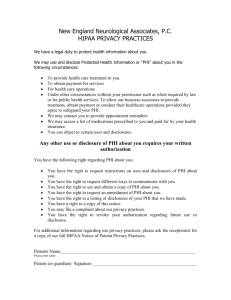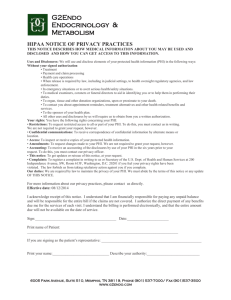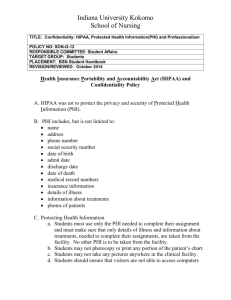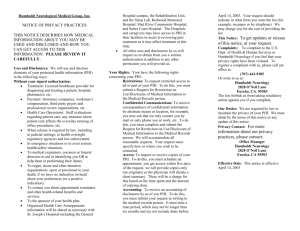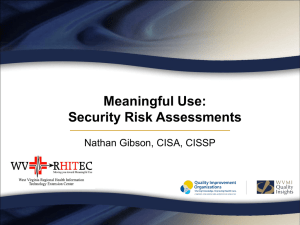Privacy, Security, and Your Practice: HIPAA Refresher
advertisement
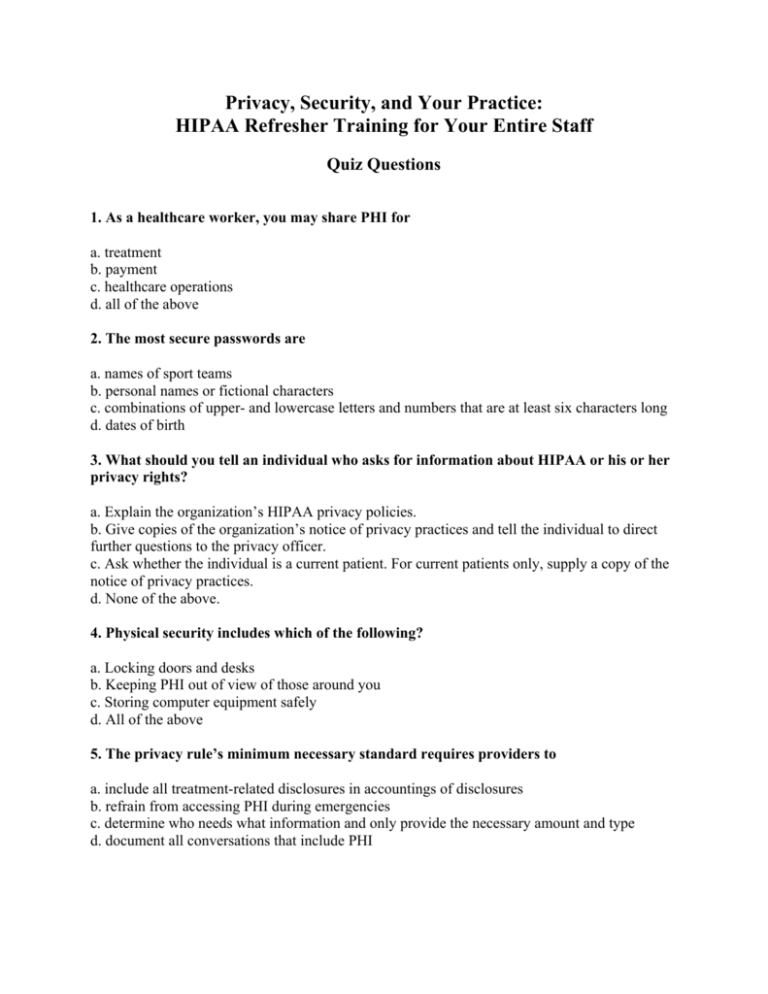
Privacy, Security, and Your Practice: HIPAA Refresher Training for Your Entire Staff Quiz Questions 1. As a healthcare worker, you may share PHI for a. treatment b. payment c. healthcare operations d. all of the above 2. The most secure passwords are a. names of sport teams b. personal names or fictional characters c. combinations of upper- and lowercase letters and numbers that are at least six characters long d. dates of birth 3. What should you tell an individual who asks for information about HIPAA or his or her privacy rights? a. Explain the organization’s HIPAA privacy policies. b. Give copies of the organization’s notice of privacy practices and tell the individual to direct further questions to the privacy officer. c. Ask whether the individual is a current patient. For current patients only, supply a copy of the notice of privacy practices. d. None of the above. 4. Physical security includes which of the following? a. Locking doors and desks b. Keeping PHI out of view of those around you c. Storing computer equipment safely d. All of the above 5. The privacy rule’s minimum necessary standard requires providers to a. include all treatment-related disclosures in accountings of disclosures b. refrain from accessing PHI during emergencies c. determine who needs what information and only provide the necessary amount and type d. document all conversations that include PHI 6. How can you prevent malicious software (malware) from harming your organization’s network? a. Install software (e.g., music-sharing software, remote-access software, etc.) only with approval from your organization’s technical staff b. Connect other devices (e.g., laptop computers or personal digital assistants) to the network only with approval from your organization’s technical staff c. Download antimalware tools to your computer d. Both a and b 7. Your cousin is a patient at your practice. You are not involved in her treatment but would like to send her a get-well card. What is the best way to find out details about her treatment? a. Ask her physician for the information. b. Ask her directly. c. Access her medical record. d. Do nothing at all. HIPAA does not allow you to send her a get-well card. 8. When discussing PHI, try to a. lower your voice b. use nongeneric terms c. move to a more private area d. both a and c 9. In regard to PHI, front desk staff should a. make sure PHI is not easily viewable to others by closing files and turning computer monitors b. refrain from disclosing PHI to physicians during an emergency c. avoid using sign-in sheets d. share computer passwords to speed up patient wait times 10. A patient may inspect or copy his or her entire medical record except for a. psychotherapy notes b. notes or information compiled for use in a civil, criminal, or administrative proceeding c. information that a licensed provider determines will likely endanger the life or safety of the patient or another person d. all of the above Privacy, Security, and Your Practice: HIPAA Refresher Training for Your Entire Staff Quiz Answers Question #1 Answer: D Reason: HIPAA does not restrict healthcare workers from sharing PHI for treatment, payment, or healthcare operations. This includes using or disclosing PHI to properly care for a patient, ensure proper billing, and aid in quality-improvement efforts. Question #2 Answer: C Reason: Using at least a six-character password of upper- and lowercase letters and numbers is more secure than using names or dates of birth. Consider using a word or subject that interests you and converting it into a character sequence meaningless to everyone but you. Question #3 Answer: B Reason: HIPAA’s privacy rule requires healthcare organizations to provide patients with a notice explaining their rights and how the provider may use their PHI. Anyone—even people who are not currently patients—may receive a copy of this notice. Question #4 Answer: D Reason: Physical security involves common-sense steps to safeguard information from physical threats (e.g., theft). These steps include locking doors and desks, making sure that those around you cannot easily view PHI, and storing computer equipment safely and securely. Question #5 Answer: C Reason: Some staff members do not need access to PHI and others may need only partial access. HIPAA’s minimum necessary standard requires staff members to consider this and judge who needs access to what information. The minimum necessary standard does not apply to treatment situations. Question #6 Answer: D Reason: Software or hardware installed without the approval of your technical support department can cause security problems. Unapproved installations may disable your computer, threaten your organization’s network, or contain malicious software that could allow access to someone not approved to see the information. Question #7 Answer: B Reason: The privacy rule includes a minimum necessary standard that requires providers to determine who needs what information and only provide the necessary amount and type. Question #8 Answer: D Reason: Even if your discussions of PHI are legitimate, acknowledge that others may be able to hear the conversation. When discussing patients, think to yourself, “Who else can hear?” and adjust your behavior based on the answer. Question #9 Answer: A Reason: The front desk is one area where patient information can easily be exposed, so staff should make every effort to protect it. Ensure patients approaching the desk can’t easily view another patient’s confidential information, especially when you step away from the desk. Question #10 Answer: D Reason: Patients have the right to inspect and obtain copies of their medical records. HIPAA allows a few exceptions to this rule, including psychotherapy notes, information that may endanger the patient or others, and information compiled for use in civil, criminal, or administrative proceedings. Lauren McLeod Group Publisher HCPro, Inc. ___________________ Privacy, Security, and Your Practice: HIPAA Refresher Training for Your Entire Staff has watched and successfully passed the final exam of _____________________________________ This is to certify that Certification of Completion

